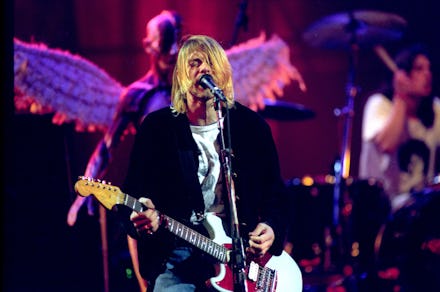21 Years Later, Kurt Cobain's Brilliant Advice on Love Is More Relevant Than Ever

The brooding, enigmatic Kurt Cobain may not be the first musician you associate with the word "love." The Nirvana singer-songwriter's work was cast in a melancholy that doesn't seem compatible with the our idealized, Hallmark version of love. But the fact that Cobain's perspective on love was of the uncommercial variety may make it even more valuable.
Beneath the harsh guitars and spitting, often profanity-laced lyrics, Cobain had a deeply emotional, tender and even romantic side, something more evident than ever with the recent surfacing of his cover of "And I Love Her" by the Beatles. He was also openly feminist, as his quotes on rape and the oppression of women show.
When it came to his own songs, Cobain's stripped-down performances offer a unique perspective on one of the most basic, and necessary, human emotions. Here are 11 unconventional lessons on love we're still taking from Kurt.
When you know you're in love, act on it now — not later.
Though "Love Gun" was originally recorded by the legendary rock band Kiss, Nirvana made it their own by infusing it with a dark, gritty edge. In their version, you really hear that there is no tomorrow, no consequences, just that undeniable attraction. In Cobain's hands, that final "okay" is full of resignation and inevitability.
There's nothing like the ecstasy of new love.
This song, from one of Nirvana's early albums, Incesticide, feels palpably young and unbridled. Cobain's vocals skitter and slink, full of that after-dark energy. It's a potent combination of love and lust, and the song grooves on like a train with no breaks — much like that feeling of a brand-new affair.
Sometimes you just need someone to fulfill your simplest needs.
Some relationships just work, as a matter of need, convenience and accessibility. In the 1989 "About a Girl," a song about his then-girlfriend Tracy Marander, Cobain digs in to what he really needs out of a functional relationship, at the simplest, most human level. Sometimes what we want from love and partnership isn't complicated (although that doesn't always make it easier...).
The deepest loves are all-consuming and disorienting.
"Heart-Shaped Box" is one of those legendary Nirvana songs, from their third and final studio album, In Utero, that offered a totally new perspective from the freshest voices in music. The song is most likely about Cobain's relationship with then-Hole frontwoman Courtney Love, and it digs into one of the darker sides of love: falling so far and so deep into a relationship that you start to feel you don't even belong to yourself. With the image of imprisonment, Cobain reminds us that love isn't entirely voluntary or controllable.
You can't have a loving relationship without forgiveness.
Originally recorded by the Dutch band Shocking Blue, Nirvana's 1988 version of "Love Buzz" channeled retribution and forgiveness, with Cobain pleading over and over in the simple lyrics. The sentiment is one plenty of couples can probably relate to: "I messed up, but please don't you mess up, too." As the band's first single, "Love Buzz" channels the darker, less pleasant, but all too real aspects of loving someone.
We all have our selfish moments, even in love.
No one, even the most deeply loving person, can avoid occasional selfish moments. The subtle power struggles and the influence of ego in a relationship aren't often talked about, probably because those are not feelings that people want to admit to having. But self-indulgence and self-pity, those utmost human emotions, can't help but affect a relationship, as Cobain draws attention to in "On a Plain," off the 1991 album Nevermind.
A great relationship motivates you to be your best self.
Another cover, this time of the legendary Scottish band The Vaselines (and the lyrics slightly tweaked), the 1991 "Molly's Lips" sounds more commercial than Nirvana's other songs at the time. But the track, with its poppy sheen, captures the feeling of new love as full of opportunity — and full of pressure to seem and act perfect for another person.
Sometimes caring so much about a person means being lonely.
This song, sometimes titled "Where Did You Sleep Last Night" and otherwise called "In the Pines" or "Black Girl," is actually a traditional American folk song popular in the 1940s. There are many versions of the song — it was passed down orally, after all — but the haunting melody and message come through on every version, including the one Cobain performed at MTV Unplugged: Nirvana show in 1993. When Cobain howls, the words are forlorn and desolate, full of aching and loss.
Even the best relationships can go sour.
"Milk It," also from In Utero, is typically dark, fraught with now-prescient references to suicide. The song may be a metaphor for some of the illnesses that plagued Cobain (he battled with stomach ulcers), or even addiction. But the lyrics most powerfully offer a perspective on toxic relationships, acknowledging how we contribute to them, feeding them with our own highs and lows. This song is off-balance and careening, like a toxic relationship can be.
Loving someone takes being vulnerable.
This is one of the few songs, way back in 1989, in which Cobain talks about fame, seemingly addressing his listeners. (Like "Love Gun," the track was originally by Kiss.) But the insecurity in the lyrics speaks to any relationship, from the celebrity-fan connection to the relationship between loved ones. The earnest question is imploring and vulnerable, no matter who's asking it.
Sometimes the best thing for a relationship is to move on.
"You Know You're Right" was the last song Nirvana recorded before Cobain's suicide in 1994. Even without this lens, it's a painfully sad song, suffused with tragedy and despair. The lyrics are a resigned break-up note. The message is clear: It's not you, it's me. It's really me.